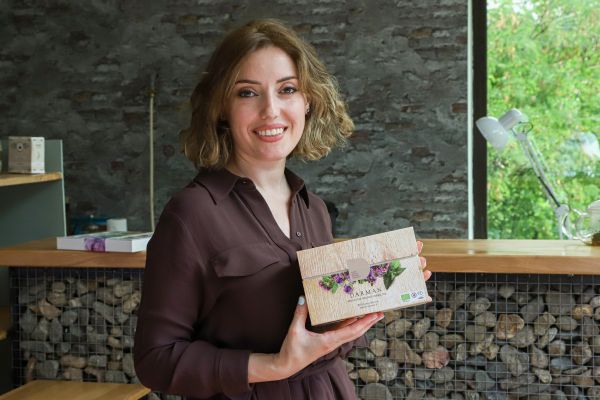Darman Tea from Armenia Conquers European Markets thanks to EU Support

In 2014, Gnel Nazaryan and Ruzanna Kardashyan started a family business in the Tavush village of Tavush region, selling a range of teas called Darman, made from herbs gathered in the wild. Their social enterprise has received support from the European Union. As a result, Darman Tea is now a product that is not just familiar to Armenian consumers but also in the European market. Six years after founding their company, Gnel and Ruzanna have answered some questions for EU4Armenia.am.
How was your family business created?
We’ve had the first-hand experience of the lifegiving force of nature and its beneficial properties. After overcoming certain health issues thanks to traditional medicine, we “sought the help” of plants to cleanse our bodies and strengthen our immune systems. The results we achieved were indescribable. Inspired by the impact we felt on ourselves, we decided to share this experience and make the plants available to the public as well, presenting our range of Darman Tea, blessed with the unique taste and useful properties of Armenian herbs. At first, we would collect and dry the herbs ourselves while also, naturally, reading the available literature on their properties. We offered them for people to taste and collected their feedback, and they encouraged us to do this work. On the other hand, we had challenged ourselves to produce something that would complement the brands already being exported from Armenia. Given that we had quality raw materials (whole leaves and flowers from herbs collected in the wild), we founded our company in 2014, and the next step was to make sure that the tea was packaged nicely. It took us a year to get the attractive design we use on our boxes, and we sold the first batch at Zvartnots airport. We were encouraged by how sales started because it proved that our products were unique and in demand.
What is a Darman Tea like?
They say that herbs allow the human body to absorb the energy of the sun. We are from Tavush by birth and decided to collect most of our raw material from the Berd region of Tavush, which is along the border. The reason for this is not only because the plants there taste very good, but also because Tavush is considered the most environmentally clean part of Armenia. There are no factories there, and we have virgin forests, with no human activity nearby. This unique natural environment and the delicate taste of the Armenian sun, soil, and water ensure the high quality of the herbs growing here at an elevation of 1300-2700 metres above sea level. You can judge for yourself by tasting one of our Darman teas. It is also worth mentioning that our teas, with their delicate aroma and beneficial properties, never contain caffeine, which is present in other teas on the market. In 2018, we shifted to organic production and made sure that our whole value chain—collection, processing, combination, packaging—matched European standards.
How many employees do you have, and are community residents also involved in the company’s work?
Because we scaled up production in 2017, we built a processing unit and created five new jobs. This has now grown to ten jobs, which involve the residents of the nearby villages, all of which are on the border. We prioritise continuity, so we have had a stable group of collectors and processors over the years. The group members undergo training sessions every year, covering everything from how to collect, all the way to packaging. The collection period goes from May to October. Our group carries out the collection from territories that the organic certification company has confirmed. Besides Tavush region, we have groups for traditional processing activities in Lori, Gegharkunik, Syunik and other regions. Overall, more than a hundred people are involved in our seasonal work.
To what extent was EU support crucial for the development of your social business?
For the development of our business, the role of specialised consultations, training opportunities, service provision, and participation in international trade fairs was no less important than financial support. As part of EU4Business, we received support to create branding elements for the new kinds of tea as well as honey and natural syrups that we later began to produce. Within the scope of the EU4Business: Ready to Trade programme, we participated in international trade fairs that helped us really understand the demand and supply currently prevailing in the market. The consultation services that we received as part of the programme gave us a newly-designed brand and allowed us to nearly triple our range of products, thanks to which we managed to scale up and become more familiar to tea lovers. We also launched the Darmantea.com website, which has significantly helped our brand recognition and had a positive impact on sales.
What new targets have you set yourselves for the near future?
Our company exports the products to France under the brand name Darman. We are currently working with companies in other European countries so that we can also sell our products there. The main targets we have set ourselves are to expand our range of products, further develop our brand, grow our markets, and develop our production volume sustainably.